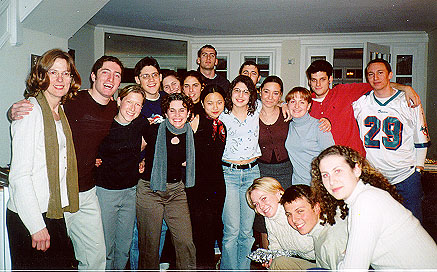representations of the Holocaust in literature and film
a freshman seminar, fall 2000
taught by Professors Millicent Marcus and Al Filreis
Tuesday-Thursday, 10:30 AM; screenings Mondays 4 PM
Logan Hall 392 (screenings in Nursing 112)
This is a seminar about the Holocaust as it has been depicted in books, film, and written or oral testimony by survivors. The Holocaust is aptly conceived as a locus for studying the most basic and urgent problems of aesthetics and authority, of metaphorizing memory and pain, of representing evil, of symbolism and action, of narrative immediacy and political truth-telling, and of testimony (witness-bearing) as legal and language forms. Participants in the seminar will approach all these topics through interactive discussions of a wide variety of films, commentaries, literary texts, testimonies, and theoretical writings about the Holocaust.
English 16 is a freshman seminar. Others may enroll only by permission of the instructors. Assignments will include six short papers and a final exam. In addition to attending all regular class meeting times, students will be expected to attend all film screenings (most Mondays at 4 PM).
reading schedule
- 9/12 & 9/14: Holland, Europa, Europa [Marcus] (screening 9/11)
- 9/19 & 9/21: Levi, Survival in Auschwitz [Filreis]
- 9/26 & 9/28: Bassani, The Garden of the Finzi-Contini; film by De Sica [Marcus] (screening 9/25)
- 10/3 & 10/5: Spielberg, Schindler's List [Marcus] (screening 10/2)
- 10/6: visit to Holocaust Museum in Washington, D.C.
- 10/10 & 10/12: Keneally, Schindler's List [Filreis]
- 10/17 & 10/19: Yale video testimonies; Lawrence Langer, Holocaust Testimonies (screening 10/16) [Filreis]
- 10/24 & 10/26: Wertmuller, Seven Beauties; [Marcus]; Terrence Des Pres, The Survivor, Bruno Bettelheim, review of Des Pres and Wertmuller [Filreis] (screening 10/23)
- 10/31 & 11/2: Benigni, Life Is Beautiful [Marcus] (screening 10/30)
- 11/7 & 11/9: Levi, The Periodic Table [Filreis and Marcus]
- special two-part screening of
Shoah:
- Sunday, 11/12: 1:30 PM-5 PM, dinner break 5-6 PM, 6-9 PM
- Monday, 11/13: 4 PM (regular screening time)
- 11/14, 11/16, 11/21: Lanzmann, Shoah [Marcus and Filreis]
- 11/28 & 11/30: Shoah and the limits of representation [Filreis] (readings from Friedlander; symposium on Schindler's List from the Village Voice [photocopy handout])
- 12/5 & 12/7: Levi, The Truce; Francesco Rosi, The Truce [Marcus] (screening 12/4)
texts
- Giorgio Bassani, Garden of the Finzi-Contini
- Primo Levi, Survival at Auschwitz; The Periodic Table; The Truce (or The Reawakening)
- Lawrence Langer, Holocaust Testimonies
- Terrence Des Pres, The Survivor
- Bruno Bettelheim, review of Des Pres and Wertmuller from The New Yorker
- Thomas Keneally, Schindler's List
- Saul Friedlander, ed., Probing the Limits of Representation
- photocopies of symposium on Schindler's List originally published in the Village Voice (March 29, 1994)
films
exam
There will be a comprehensive final examination, given during the regularly
scheduled time assigned to this course by the university registrar. (The
date and time will be announced during the term.)
papers
Students will be required to write six short papers (2 pages,
double-spaced, approximately 500 words). Three of the papers will be
Type
A writing assignments, and three will be Type B.
choosing three of the five occasions when such papers are due. But note
that the Periodic Table assignment is required of all students,
so in effect you must write 2 of the other 4 options. The topics
for these papers are given below. Type B papers must be handed in at
the beginning of class on the first day of discussion of the relevant text
(mostly Tuesdays). Papers handed in after class or on Thursday of that week
will not be accepted. The point of this paper is for student to write about
a work before we discuss it in class. Type B papers can be
handed in at the beginning of class on 9/19, 10/10, 10/17 (note that
this is a Type B week), 11/7, and 11/28.
Paper topics for Type B are as follows:

Primo Levi in later years
